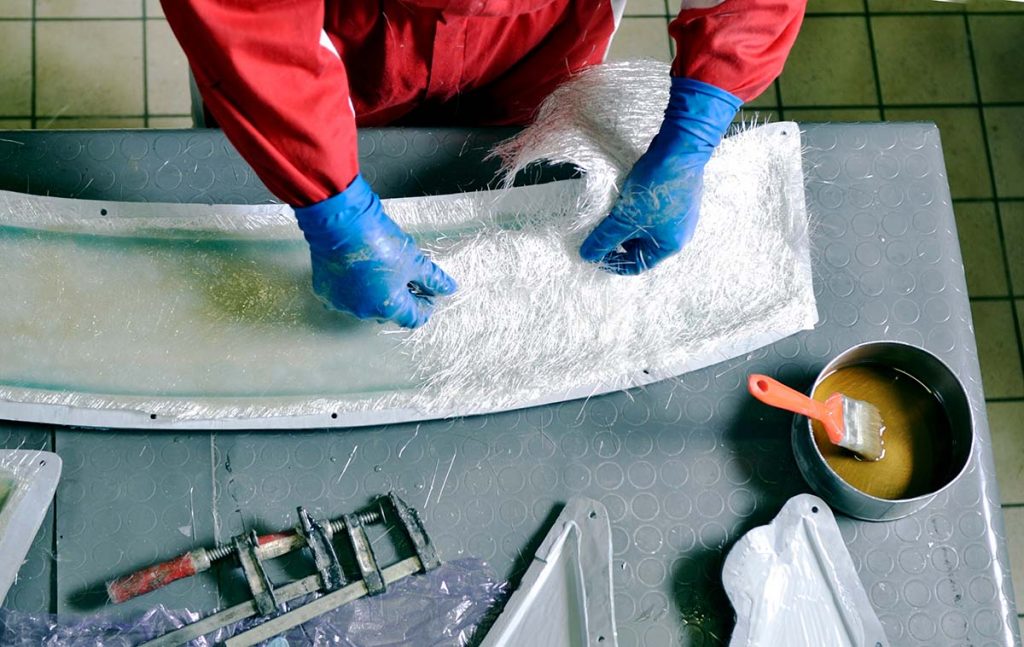Unsaturated Polyester Resin (UPR) is a polymer compound formed through the condensation reaction between dibasic acids and diols, containing unsaturated double bonds in its structure. As a thermosetting resin, UPR plays a crucial role in industrial production, especially in the fiberglass (FRP) and related industries. In this article, we will explore the definition, properties, and primary applications of unsaturated polyester resin to help businesses and engineers understand its advantages and potential.

What is Unsaturated Polyester Resin?
Unsaturated polyester resin is a polymer compound made from dibasic acids and diols through condensation reactions. The molecule contains unsaturated double bonds, enabling it to react with other chemicals to form stronger solid materials. Common unsaturated polyester resins are typically dissolved in monomers like styrene, forming a viscous liquid, which is widely used across various industries.
Key Properties of Unsaturated Polyester Resin
- Corrosion Resistance
Unsaturated polyester resin exhibits excellent corrosion resistance, allowing it to withstand acids, alkalis, salts, and organic solvents. It is widely used in industries such as petroleum, chemical, electroplating, and electrolysis, making it an irreplaceable material for corrosion protection. - Lightweight and High Strength
With a density of 1.4-2.2g/cm³, unsaturated polyester resin is 4-5 times lighter than steel, yet it has strength comparable to carbon steel and aluminum, making it ideal for industries like aerospace and automotive that require lightweight, high-strength materials. - Excellent Thermal Performance
Unsaturated polyester resin has a low thermal conductivity (0.3-0.4 Kcal/mh°C), making it an ideal thermal insulator. FRP products made from this resin offer superior heat insulation properties, suitable for applications in energy-saving building materials, such as windows and pipelines. - Processing Ease
Unsaturated polyester resin has excellent processing characteristics and can be molded at room temperature and pressure, or cured with heat and pressure. This flexibility makes it ideal for creating a variety of non-fiberglass enhanced materials like crafts, furniture coatings, and more. - Electrical Properties
The resin has excellent electrical insulation properties and retains its dielectric performance even at high frequencies. It does not reflect radio waves and has good microwave transmission, making it ideal for electrical and instrumentation applications that require reliable, long-lasting materials.
Major Applications of Unsaturated Polyester Resin
Unsaturated polyester resin is applied across various industries, divided into fiberglass (FRP) applications and non-fiberglass applications:
1. Fiberglass (FRP) Applications
- Construction Industry: Used for manufacturing cooling towers, doors, windows, light construction, fans, and water collectors.
- Transportation: Including fiberglass vehicles, boats (such as yachts, lifeboats, and dinghies), and amusement equipment.
- Corrosion Protection: Used in fiberglass pipes, storage tanks, valves, and other corrosion-resistant engineering products.
- Energy-Efficient Products: Includes centrifugal fans, axial fans, solar water heaters, and wind turbines.
2. Non-Fiberglass Applications
- Crafts and Decoration: Used in making crystal crafts, artificial stones, buttons, etc.
- Coating Materials: Includes coatings for furniture, electrical appliances, car repairs, and more.
- Artificial Stone: Such as artificial marble, granite, and other decorative materials.
- Other Applications: Including putties for automotive repairs, adhesive agents, and more.
Advantages of Unsaturated Polyester Resin
- Durability
Unsaturated polyester resin offers excellent corrosion resistance and UV stability, making it ideal for outdoor and harsh environment applications, especially in industries like chemical processing, construction, and water treatment. - Design Flexibility
Combining unsaturated polyester resin with fiberglass allows for flexible structural designs. Products can be tailored for specific functions, such as corrosion resistance, high temperature endurance, UV protection, and fire resistance. - Low Maintenance Costs
Due to its exceptional resistance to corrosion and long service life, products made from unsaturated polyester resin generally require less maintenance, reducing the total cost over time.
Conclusion
Unsaturated polyester resin (UPR) has become an indispensable material in modern industries due to its unique properties. It is widely used in the production of fiberglass products and in many other sectors, including construction, transportation, home furnishings, and electronics. As technology continues to evolve, the application scope of unsaturated polyester resin will expand, offering more efficient and sustainable solutions to various industries.
Understanding the properties and applications of unsaturated polyester resin helps businesses make informed decisions when selecting materials, driving innovation and progress across industries.
